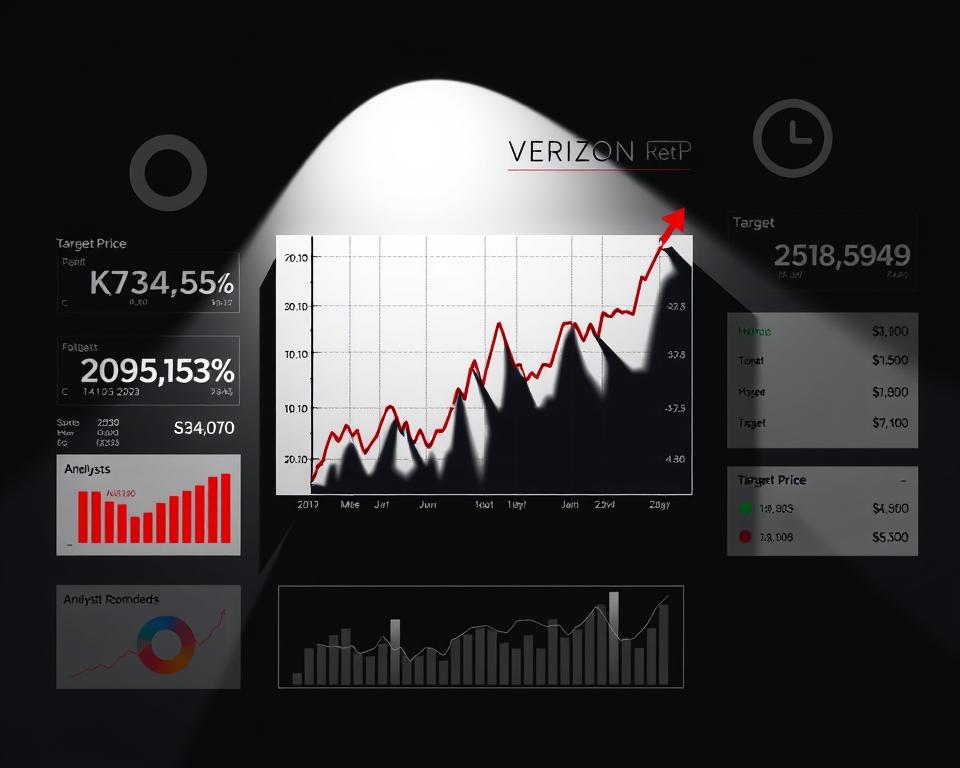As a key player in the telecommunications industry, Verizon Communications Inc. continues to be a topic of interest among investors. With its ticker symbol VZ listed on the New York Stock Exchange and NASDAQ Global Select Market, the company’s market performance is closely monitored.
The current market data shows that VZ is trading at $43.32 USD, with a 0.44% increase in the past 24 hours. This fluctuation highlights the dynamic nature of the stock market. Our comprehensive guide provides real-time updates and in-depth analysis to help you make informed investment decisions.
By examining historical trends and key financial metrics, we offer valuable information to investors looking to stay ahead of the curve.
Current Verizon Stock Performance
Today’s trading session is seeing significant activity in Verizon Communications Inc.’s shares. As of today, Verizon Communications Inc. has a market capitalization of $182.65B, representing a decrease of -2.83% over the last week.
Today’s Price Movement
The stock’s price movement today reflects the overall market sentiment towards Verizon Communications Inc. With shares being closely monitored by investors, any significant change can impact the overall market.
24-Hour Trading Volume
The 24-hour trading volume for Verizon stock is a crucial indicator of market liquidity and investor interest. A higher than average volume often signals significant news or a change in market sentiment toward the company. For instance, trading volume patterns throughout the day can reveal when institutional investors are entering or exiting positions. Moreover, volume spikes often correlate with price movements, validating the strength of price trends or reversals. By comparing current volume to historical averages, investors can contextualize today’s trading activity within longer-term patterns, making informed decisions about their trade in the market.
Verizon Stock Price Overview
Analyzing Verizon’s stock price trends and indicators provides valuable insights for investors and financial analysts alike. Verizon Communications’ stock is currently showing a volatility of 1.45% and has a beta coefficient of 0.26, indicating its relative stability in the market.
Recent Price Trends
The recent price trends of Verizon stock reveal a nuanced picture. Technical indicators such as RSI, MACD, and Bollinger Bands offer insights into the stock’s momentum and potential reversal points. These indicators help investors understand whether the stock is trending upwards or downwards.
Key Price Indicators
Key price indicators for Verizon stock include volatility metrics, volume-based indicators, and price-based moving averages. These indicators collectively provide a comprehensive view of Verizon’s current technical position. Some key points to consider are:
- Technical indicators like RSI and MACD provide insights into the stock’s momentum.
- Volatility metrics help investors understand risk levels compared to the broader market.
- Volume-based indicators reveal patterns of accumulation or distribution.
Historical Verizon Stock Performance
Analyzing Verizon’s historical stock performance provides valuable insights into the company’s growth trajectory and market trends. This analysis is crucial for understanding the factors that have influenced the stock’s price over time.
All-Time Highs and Lows
Verizon Communications has experienced significant price movements since its inception. The stock has reached various all-time highs and lows, reflecting the company’s financial health and market conditions on specific dates. These extreme price points are important indicators for investors assessing potential future performance.
Stock Split History
Verizon’s stock split history is a notable aspect of its financial record. The company has implemented several 2-for-1 stock splits on the following record dates and effective dates: March 31, 1986 (effective April 17, 1986), April 10, 1990 (effective May 1, 1990), and June 1, 1998 (effective June 29, 1998). These splits indicate periods of strong performance and share price appreciation, making the stock more accessible to investors.
- Each stock split represents a milestone in Verizon’s growth, typically occurring during sustained price appreciation periods.
- Understanding these splits is essential for accurately interpreting long-term price charts and performance metrics.
- The timing between splits provides insight into historical growth rates and management’s approach to share price management.
Verizon’s Market Position
Verizon’s standing within the industry can be understood by examining its market capitalization and competitive positioning. As a major player in the wireless telecommunications industry, Verizon operates within the broader communications sector.

Market Capitalization
Verizon’s market capitalization is a key indicator of its size and influence within the industry. As of May 2025, the largest communications services companies by market cap include Alphabet, Meta Platforms, and Tencent, which dominate the communications sector.
Comparison to Competitors
Verizon’s competitive positioning can be assessed through various metrics, including market share comparisons across wireless, broadband, and enterprise services. Revenue growth rates and profitability metrics such as operating margins also provide insight into Verizon’s operational efficiency relative to industry peers.
Key Financial Metrics
Verizon Communications Inc.’s financial health can be understood by examining key financial metrics. These metrics provide valuable insights into the company’s operational efficiency and overall financial condition.
Price-to-Earnings Ratio
The Price-to-Earnings (P/E) ratio is a critical metric that helps investors understand the company’s valuation relative to its earnings. A reasonable P/E ratio indicates that Verizon Communications Inc. is fairly valued in the market, considering its earnings per share.
Revenue and Net Income
Verizon reported a revenue of $134.79 billion and a net income of $17.51 billion in the fiscal year. The company’s revenue streams are diversified across consumer wireless, business services, and emerging technology initiatives. Key highlights include:
- Diversified revenue streams driving top-line growth.
- Quarterly revenue trends showing seasonal patterns and the impact of new product launches.
- Net income figures demonstrating the ability to convert revenue into profit.
Verizon’s financial performance is further highlighted by its ability to manage operating expenses and capital investments, contributing to its net income. The company’s products and services cater to a wide range of customers, including consumers, businesses, and governmental agencies.
Verizon Dividend Analysis
Verizon Communications has been a stalwart in dividend payments, reflecting its financial stability. Investors closely watch the company’s dividend yield and payout ratio to gauge its commitment to returning value to shareholders.
Current Dividend Yield
The current dividend yield of Verizon Communications Inc. stood at 6.71% in 2024, slightly lower than the 6.99% recorded the previous year. This metric is crucial for income-seeking investors who rely on regular payouts.
Dividend Payment History
Verizon’s payout ratio reached 64.77% in 2024, indicating a sustainable dividend program. This is a significant improvement from the 95.63% recorded the year before, showcasing the company’s ability to manage its dividend payments effectively.
Verizon has established a consistent dividend payment history, demonstrating management’s commitment to returning value to shareholders. The company’s track record of dividend increases reflects its financial stability and cash flow generation capabilities.
Recent Earnings Reports
Verizon Communications’ recent financial disclosures have provided investors with valuable insights into the company’s performance. The latest quarterly results have been particularly noteworthy.
Latest Quarterly Results
Verizon’s earnings for the last quarter were $1.19 USD per share, exceeding the estimated $1.15 USD. This positive performance is a significant indicator of the company’s financial health.
Earnings Surprises
The surprise of 3.77% was a welcome outcome for investors. Here are some key points to consider:
- Verizon’s recent earnings surprises relative to analyst expectations provide insight into management’s forecasting accuracy and operational execution.
- Positive surprises often trigger short-term price movements as the market recalibrates expectations for future performance.
- The magnitude of earnings beats or misses compared to historical patterns reveals whether the company is becoming more or less predictable.
The estimated earnings for the next quarter are $1.19 USD per share, maintaining a consistent performance trajectory.
Analyst Recommendations
Analyst recommendations play a crucial role in understanding the potential future performance of Verizon Communications Inc.. These recommendations are based on thorough analyses of the company’s financial health, market trends, and competitive positioning.
Buy, Hold, and Sell Ratings
Analysts provide buy, hold, and sell ratings based on their assessment of Verizon’s stock. These ratings help investors make informed decisions. The distribution of these ratings gives insight into the overall sentiment towards the stock.
- Buy ratings indicate a positive outlook, suggesting the stock is likely to perform well.
- Hold ratings suggest a neutral stance, indicating the stock is expected to perform in line with the market.
- Sell ratings signal a negative outlook, suggesting the stock may underperform.
Price Targets
According to analysts, the price of VZ stock has a max estimate of 52.00 USD and a min estimate of 42.00 USD. These estimates are derived from various models, including discounted cash flow analysis and comparable company analysis.

The range between the highest and lowest price targets indicates the degree of uncertainty about Verizon’s future performance. Understanding these targets helps investors align their expectations with analyst projections.
Verizon Business Overview
Verizon is a prominent telecommunications company that delivers comprehensive services to consumers and businesses alike. The company operates through various subsidiaries, providing a broad spectrum of communications, information, and entertainment products and services.
Company Segments
Verizon’s operations are diversified across multiple segments, including consumer and business services. The company has also made significant investments in its media and technology divisions through subsidiaries like Oath Inc., which houses over 50 media and technology brands following the combination of Yahoo! Inc.’s operating assets with AOL Inc.
Business Strategy
Verizon’s business strategy focuses on maintaining network leadership, particularly in 5G deployment, to stay competitive in wireless services. The company is also exploring fixed wireless access to expand its broadband market share. Strategic partnerships with content providers and technology companies are enhancing Verizon’s service offerings, creating differentiated value propositions. Additionally, the company’s capital allocation priorities balance network investments, dividend payments, and debt management to optimize long-term shareholder returns.
- Network Leadership: Verizon is prioritizing 5G deployment to maintain a competitive edge.
- Fixed Wireless Access: The company is leveraging this technology to expand broadband market share.
- Strategic Partnerships: Collaborations with content and technology companies are enhancing service offerings.
Verizon Stock Performance vs. S&P 500
Verizon’s stock performance versus the S&P 500 is a significant indicator of its market position and potential for growth. This comparison helps investors understand Verizon’s standing in the broader market.
1-Year Comparison
Over the past year, Verizon’s stock has shown a resilient performance compared to the S&P 500. The data indicates that Verizon’s annualized return is competitive, reflecting its stability in the telecom sector.
5-Year Comparison
When examining the five-year performance, Verizon’s stock has demonstrated a steady growth trajectory. The company’s strategic initiatives, such as its 5G network deployment, have contributed to its competitive edge. As noted by industry experts, “Verizon’s commitment to innovation has been a key driver of its success.”
“The telecom giant has successfully navigated the challenges of a rapidly evolving industry.”
The annualized return over five years highlights Verizon’s ability to maintain a stable investment environment.
Factors Affecting Verizon Stock Price
Multiple factors contribute to the fluctuations in Verizon‘s stock price. The company’s performance is closely tied to both industry trends and company-specific developments.
Industry Trends
Industry trends significantly impact Verizon Communications Inc.‘s stock performance. Leadership changes and major capital investments are crucial in shaping investor perception and the company’s competitive positioning.
Company-Specific Developments
Company-specific developments, such as subscriber metrics and debt management strategies, also play a critical role. These factors influence the company’s business flexibility and ability to invest in growth while maintaining its dividend program, ultimately affecting its portfolio.
Conclusion
Verizon Communications Inc.’s stock represents a significant investment opportunity in the telecommunications sector. Its strong dividend program provides reliable income, while its established market position offers relative stability.
Investors should consider Verizon stock within their overall portfolio strategy, particularly regarding income requirements and sector allocation. Regular analysis of key performance metrics and industry trends remains essential for evaluating Verizon’s long-term stock potential.
